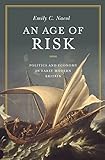An Age of Risk : Politics and Economy in Early Modern Britain / Emily Nacol.
Material type: TextPublisher: Princeton, NJ : Princeton University Press, [2016]Copyright date: ©2017Description: 1 online resource (184 p.)Content type:
TextPublisher: Princeton, NJ : Princeton University Press, [2016]Copyright date: ©2017Description: 1 online resource (184 p.)Content type: - 9780691165103
- 9781400883011
- Economics -- Great Britain -- History -- 17th century
- Economics -- Great Britain -- History -- 18th century
- Risk -- Philosophy
- PHILOSOPHY / Political
- Adam Smith
- David Hume
- John Locke
- Lockean political trust
- Michel Foucault
- Thomas Hobbes
- civil war
- commerce
- commercial actors
- early modern Britain
- early modern period
- economic risk
- eighteenth century
- future uncertainty
- geometry
- human ambivalence
- knowledge
- liberalism
- mercantile policies
- monopolies
- moral theory
- nineteenth century
- philosophical skepticism
- political authority
- political economy
- political order
- political risk
- political subject
- political theory
- political thought
- political trust
- probabilistic calculation
- probability
- risk control
- risk prediction
- risk taking
- risk-taking
- risk
- safe political community
- security threat
- seventeenth century
- uncertainty
- unknown future
- writings
- 330.1540941 23
- HB103.A2
- online - DeGruyter
- Issued also in print.
| Item type | Current library | Call number | URL | Status | Notes | Barcode | |
|---|---|---|---|---|---|---|---|
 eBook
eBook
|
Biblioteca "Angelicum" Pont. Univ. S.Tommaso d'Aquino Nuvola online | online - DeGruyter (Browse shelf(Opens below)) | Online access | Not for loan (Accesso limitato) | Accesso per gli utenti autorizzati / Access for authorized users | (dgr)9781400883011 |
Frontmatter -- Contents -- Acknowledgments -- Chapter One. Introduction -- Chapter Two. "Experience Concludeth Nothing Universally". Hobbes and the Groundwork for a Political Theory of Risk -- Chapter Three. The Risks of Political Authority. Trust, Knowledge, and Political Agency in Locke's Politics and Economy -- Chapter Four. Hume's Fine Balance. On Probability, Fear, and the Risks of Trade -- Chapter Five. Adventurous Spirits and Clamoring Sophists. Smith on the Problem of Risk in Political Economy -- Chapter Six. An Age of Risk, a Liberalism of Anxiety -- Notes -- References -- Index
restricted access online access with authorization star
http://purl.org/coar/access_right/c_16ec
In An Age of Risk, Emily Nacol shows that risk, now treated as a permanent feature of our lives, did not always govern understandings of the future. Focusing on the epistemological, political, and economic writings of Thomas Hobbes, John Locke, David Hume, and Adam Smith, Nacol explains that in seventeenth- and eighteenth-century Britain, political and economic thinkers reimagined the future as a terrain of risk, characterized by probabilistic calculation, prediction, and control.In these early modern sources, Nacol contends, we see three crucial developments in thought on risk and politics. While early modern thinkers differentiated uncertainty about the future from probabilistic calculations of risk, they remained attentive to the ways uncertainty and risk remained in a conceptual tangle, a problem that constrained good decision making. They developed sophisticated theories of trust and credit as crucial background conditions for prudent risk-taking, and offered complex depictions of the relationships and behaviors that would make risk-taking more palatable. They also developed two narratives that persist in subsequent accounts of risk-risk as a threat to security, and risk as an opportunity for profit. Looking at how these narratives are entwined in early modern thought, Nacol locates the origins of our own ambivalence about risk-taking. By the end of the eighteenth century, she argues, a new type of political actor would emerge from this ambivalence, one who approached risk with fear rather than hope.By placing a fresh lens on early modern writing, An Age of Risk demonstrates how new and evolving orientations toward risk influenced approaches to politics and commerce that continue to this day.
Issued also in print.
Mode of access: Internet via World Wide Web.
In English.
Description based on online resource; title from PDF title page (publisher's Web site, viewed 24. Aug 2021)


